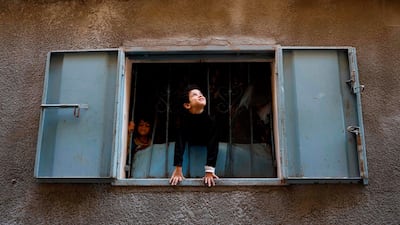Gaza geared up to start its Covid-19 vaccination programme on Monday.
It had been due to begin on Sunday, but was delayed while clinics waited for 20,000 doses of Russia’s Sputnik V vaccine, donated by the UAE, to arrive.
The Palestinian Authority health ministry in Ramallah sent 2,000 doses of the vaccine to Gaza on Wednesday through the Kerem Shalom crossing with Egypt.
The vaccines arrived on Sunday evening after a delay due to bad weather.
"We received today the shipment of vaccines ... and will start the vaccination tomorrow in Gaza," health official Dr Majdi Dahir told The National.
“We will start with medical teams, then with those with chronic illness and the elderly.”
Gaza’s health ministry said on Saturday that since the start of the pandemic, 54,270 cases were recorded there, 543 of whom died. At least 51,776 recovered in the enclave, which is controlled by Hamas.
Deputy health minister Dr Yousef Abu Alrish said that about 40 per cent of Gaza’s residents may have been infected with the coronavirus.
Palestinian authorities have eased pandemic restrictions lately and reopened schools and marketplaces.
Dr Ashraf Kalaja, 33, who works in the emergency department at Al Shifa hospital in Gaza city, said he would definitely take the vaccine if offered it.
“Since I deal directly with coronavirus patients and could be infected by the virus, I will take the vaccine, for sure,” he said.
“I encourage everyone above 45 years or has chronic disease or a weak immune system to take the vaccine. Also, I have encouraged my family to take it.”
Amani Nassrallah, who works for Gaza’s ministry of labour, registered herself and her family on My Health app launched by the health ministry. She is awaiting her turn.
“The vaccine is our only way to be protected from the virus,” she said.
But some people remain sceptical about the process.
"I will not take the vaccine because its side effects are not clear until now," Randa Faisal, a mother of five, told The National.
Babumoshai Bandookbaaz
Director: Kushan Nandy
Starring: Nawazuddin Siddiqui, Bidita Bag, Jatin Goswami
Three stars
Infiniti QX80 specs
Engine: twin-turbocharged 3.5-liter V6
Power: 450hp
Torque: 700Nm
Price: From Dh450,000, Autograph model from Dh510,000
Available: Now
BMW M5 specs
Engine: 4.4-litre twin-turbo V-8 petrol enging with additional electric motor
Power: 727hp
Torque: 1,000Nm
Transmission: 8-speed auto
Fuel consumption: 10.6L/100km
On sale: Now
Price: From Dh650,000
Joker: Folie a Deux
Starring: Joaquin Phoenix, Lady Gaga, Brendan Gleeson
Director: Todd Phillips
Rating: 2/5
NEW ARRIVALS
Benjamin Mendy (Monaco) - £51.75m (Dh247.94m)
Kyle Walker (Tottenham Hotspur) - £45.9m
Bernardo Silva (Monaco) - £45m
Ederson Moraes (Benfica) - £36m
Danilo (Real Madrid) - £27m
Douglas Luiz (Vasco de Gama) - £10.8m
The specs
Engine: 2.0-litre four-cylinder turbo
Power: 178hp at 5,500rpm
Torque: 280Nm at 1,350-4,200rpm
Transmission: seven-speed dual-clutch auto
Price: from Dh209,000
On sale: now
More on animal trafficking
PROFILE OF SWVL
Started: April 2017
Founders: Mostafa Kandil, Ahmed Sabbah and Mahmoud Nouh
Based: Cairo, Egypt
Sector: transport
Size: 450 employees
Investment: approximately $80 million
Investors include: Dubai’s Beco Capital, US’s Endeavor Catalyst, China’s MSA, Egypt’s Sawari Ventures, Sweden’s Vostok New Ventures, Property Finder CEO Michael Lahyani
Moral education needed in a 'rapidly changing world'
Moral education lessons for young people is needed in a rapidly changing world, the head of the programme said.
Alanood Al Kaabi, head of programmes at the Education Affairs Office of the Crown Price Court - Abu Dhabi, said: "The Crown Price Court is fully behind this initiative and have already seen the curriculum succeed in empowering young people and providing them with the necessary tools to succeed in building the future of the nation at all levels.
"Moral education touches on every aspect and subject that children engage in.
"It is not just limited to science or maths but it is involved in all subjects and it is helping children to adapt to integral moral practises.
"The moral education programme has been designed to develop children holistically in a world being rapidly transformed by technology and globalisation."












